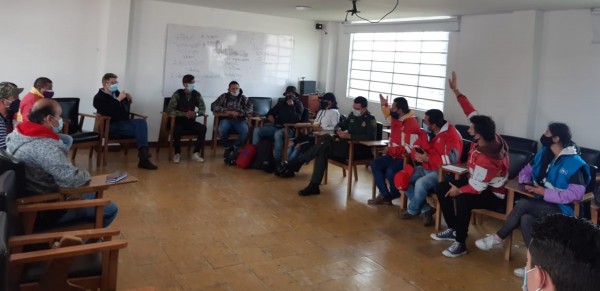
A few weeks ago, the members of the Community of Saint Paul who live and work in Bogotá were involved in a complicated situation that, fortunately, was resolved in a satisfactory way—and it left us with several lessons.
It was Thursday. At noon, a hundred young people from “Primera Línea” (an anti-government protest movement) appeared in La Resurrección neighborhood, where we live. For several months now, members of “Primera Línea” have led numerous marches against various measures of the government on the streets of Bogotá and other cities in the country. They also ask for a change in the Colombian political system.
A neighbor had offered them a vacant lot (located one block away from the parish) so that they could camp there, since they were being evicted from all the places where they had attempted to stay, in other parts of the city. The protesters arrived with several injured men (who had been wounded in their clashes with the police). Some injuries were quite serious. Then, what was predictable happened: the residents of the street where the newcomers wanted to stay did not like the idea, and the tensions, the insults, the attempts of violence began. The media have been reporting the vandalism that has sometimes accompanied the marches, and this caused some neighbors to strongly oppose the idea of sheltering protesters in their neighborhood.
We, upon hearing what was occurring, went to the place and offered a parish hall to attend to the wounded. Then we agreed to initiate a dialogue between neighbors and protesters to appease spirits and prevent all violence. We suggested that the dialogue could take place in the parish. We, as a neutral party, would act as moderators and guarantors of the dialogue. We ended up sitting around a table from three in the afternoon until after eight at night: leaders from “Primera Línea”, neighbors, staff from the mayor's office, which now had also arrived, police officers, representatives of Human Rights organizations ...
It was an exercise in patience and listening, aimed at reaching a satisfactory agreement for all. When the tension rose, and the dialogue seemed to be about to collapse, we would propose to take a break and serve snacks, and the young people from “Primera Línea” said that it was the first time they had a cup of coffee with the police (for that, everyone had to remove their hoods and masks, showing their faces). By seven in the evening the situation seemed to have stalled. The mayor of Rafael Uribe Uribe section had arrived (Rafael Uribe Uribe is the section of Bogotá where La Resurrección is located) and reported that there was nothing to discuss: the people from the protest had to leave without further delay. Otherwise, they would be forcibly evicted by the police. They were asking to stay camped for one night in the green space next to the parish, to rest and stay close to their wounded, and they promised to leave the next day. The mayor was unyielding: she had strict orders not to offer them any public property —and the land where they wanted to spend the night is public space: they could not stay. And the policemen said that they were against exercising violence, but that, if they received orders to vacate the area, they would do so using whatever means were necessary. While the dialogue seemed to be going nowhere, reports were reaching us from the street that the situation there was becoming more tense, and it threatened to spin out of control. Someone was walking the neighborhood with a loudspeaker, calling on neighbors to get out of their houses and organize a mob to drive out the intruders. And we also began to receive word that false news was running through the neighborhood and through social media, which compromised us: apparently, some people were saying that we had offered the parish church for the protesters to spend the night (not true), and that we were negotiating for them to stay six stay months in the neighborhood (false as well)…
Suddenly, the mayor said that she had just received a communication on her phone according to which the vacant lot next to the church was not a public space: it belonged to the local Neighbors’ Association. In light of this new information, the president of the Neighbors’ Association said that they would allow the young people to stay there for one night. A solution had been reached. They asked us, as representatives of the Church, to go out and inform the neighbors and the protesters of the agreement reached. We immediately set up a sound system in the square in front of the parish, we went out, and under the rain of the night, we explained the agreement reached, and the neighbors went back to their homes.
The night was calm, without altercations. The next morning the protesters kept their word and left, after sleeping in their makeshift tents under a persistent rain that did not stop falling until dawn. They left the area very clean, without a single piece of garbage.
It was an experience that, despite its unexpected nature and the fact that at times it was distressing, allowed us to experience first-hand the role of mediation that the Church can play in situations of social conflict, working so that opposing parties listen to each other, dialogue, try to understand the other position and, leaving aside emotions and prejudices, achieve what is most important: to avoid violence.









